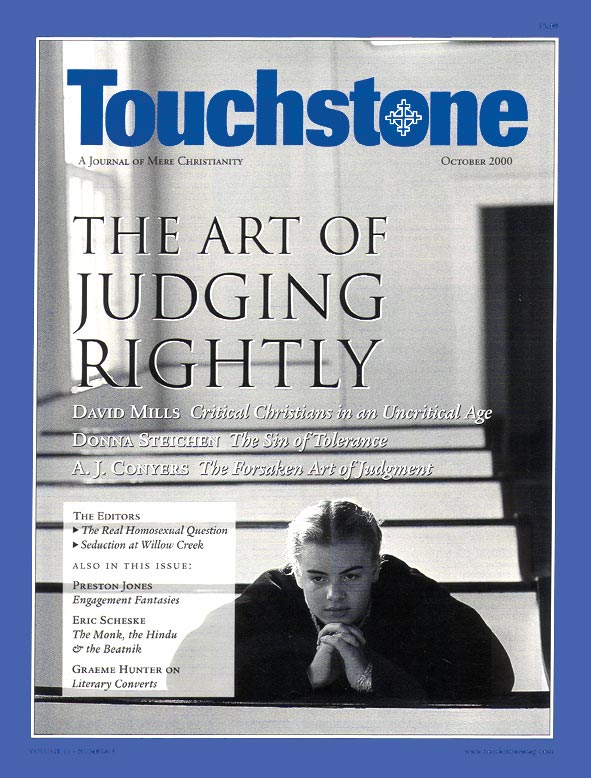The Churches & the Homosexual Agenda
Because they were covered somewhat in the secular press, and even on television, it was not difficult to follow the fortunes of the several Christian denominational conventions that met during this past summer. These were pretty well covered in the media because they contained that necessary spark of controversy, which consisted mostly in what may be called “homosexual questions.” That is to say, a major preoccupation among these religious groups had to do with proposals for accepting unrepentant homosexual sin as a legitimate path of Christian life, whether by conferring ordination upon individuals openly involved in such activity, or by actually formulating rites to give them ecclesiastical sanction as a sort of “marriage,” or both.
The “conservatives” seem, on the whole, to have carried the day, inasmuch as the voting at those denominational conventions generally tended to resist and frustrate such new developments. Indeed, examining articles and editorials written by some conservative pens in the aftermath, one sensed even a tone of victory and accomplishment.
If conservatives feel a sense of moral accomplishment, however, simply because the Methodists voted against ordaining active homosexuals, or because the Episcopalians stopped (barely) short of authorizing a liturgical rite for solemnizing the exchanged vows of homosexuals, then I say that the hopes and aspirations of conservatives must be truly modest, for these matters should never have become subjects of debate at jurisdictional conventions in the first place.
Two simple truths, I submit, should be obvious. First, to Bible-believing Christians it should be obvious that inquiries about the legitimacy of unrepented homosexual behavior can only be answered in one way. Second, to prudent minds it should also be obvious that this correct answer should be determined long before the question ever reaches the level of a denominational convention. That is to say, the determining challenge to the homosexual agenda should come much earlier in the argument. Things have now come to such a pass that whenever the Lutherans, or Presbyterians, or Methodists, or Episcopalians, or whoever gather for their periodic conventions, these same “homosexual questions” are regularly trotted out once more for further review, inevitably to the denomination’s own harm.
Why does this have to happen? There is no need for these matters to reach such an advanced stage of political plausibility that they should be discussed at the highest levels of denominational authority. Since with respect to the matter of homosexual sin Holy Scripture has traced a most distinct and unmistakable line in stone, should serious Christians delay tracing that same line resolutely in the sand? How does it happen that some Christian conservative voices wait until convention time before asserting themselves?
By way of addressing this question, I think it useful to analyze a distinction rather often heard in those discussions over the past several years, the distinction between a group’s requirements for congregational membership and the requirements for ecclesiastical leadership. Even some individuals who are clearest in their opposition to the ordination of homosexuals seem to rest their case on this distinction, arguing that unrepented homosexual behavior is incompatible with the clerical state, but not necessarily that it is incompatible with the Christian life.
I would pose two questions relative to this distinction between the varying requirements of the clerical and lay states. First, is it a valid distinction in principle? Second, is this distinction properly applicable to the matter of homosexual behavior?
With respect to the first question, the answer is a manifest yes, nor need our answer in any way be qualified, I think, by our varying understandings of “ordination,” “clerical state,” and so forth. The Pastoral Epistles in the New Testament clearly envisage one group of Christians, dedicated in some special way to the gospel ministry, who are chosen on the basis of qualifications different from those required of other Christians. However an exegete may interpret the exact sense of every particular in such passages as 1 Timothy 3:1–13 and Titus 1:6–9, it is evident that some choice is being made among Christians themselves on the basis of certain restrictions. Not all Christians are suitable for the ministries under discussion in these texts.
With respect to the second question—is this distinction properly applicable to the matter of homosexual behavior?—it seems to me that the answer must be no. There is nothing in Holy Scripture that can be construed to mean that, although an active, unrepentant homosexual can be a regular communicant of the Church, such a person is not qualified to be ordained to the gospel ministry. If such were the case, the New Testament would most certainly say so, because the homosexual lifestyle was every bit as characteristic of Greco-Roman civilization as it is of our own.
Consequently, I believe that those who would keep active homosexuals out of the clerical state, while still admitting them as communicants of the Church, are acting on principles without biblical support. If the distinction examined above is going to be the basis of their resistance to the ordination of active, unrepentant homosexuals, they cannot claim the authority of Holy Scripture. Simply put, the New Testament does not mention the homosexual vice as an impediment to an ordained ministry.
Why not? Because active, determined, unrepentant homosexuals were not welcomed into the New Testament churches at all. The unrepentant homosexual sinner was listed in the same category as the fornicator, the adulterer, the idolater, the robber, and certain other sinners of whom it says that they “will not inherit the kingdom of God” (1 Cor. 6:9f.). If one may state the matter bluntly, such persons could not be ordained because they could not be baptized. They could not preside at the Lord’s Supper because they could not partake of the Lord’s Supper. That style of life was deemed incompatible with the life in Christ, and the Church did not hesitate to tell them so. If the average Presbyterian homosexual feels “left out” because his church refuses to ordain him, how would he have felt if he had been present, in early A.D. 58, for the first public reading of Romans 1:18–27? The question is entirely speculative, because the baptismal discipline of the Church explicitly excluded active, unrepentant homosexuals (cf. Didache 2.4).
Patrick Henry Reardon is pastor emeritus of All Saints Antiochian Orthodox Church in Chicago, Illinois, and the author of numerous books, including, most recently, Out of Step with God: Orthodox Christian Reflections on the Book of Numbers (Ancient Faith Publishing, 2019).
subscription options
Order
Print/Online Subscription

Get six issues (one year) of Touchstone PLUS full online access including pdf downloads for only $39.95. That's only $3.34 per month!
Order
Online Only
Subscription

Get a one-year full-access subscription to the Touchstone online archives for only $19.95. That's only $1.66 per month!
bulk subscriptions
Order Touchstone subscriptions in bulk and save $10 per sub! Each subscription includes 6 issues of Touchstone plus full online access to touchstonemag.com—including archives, videos, and pdf downloads of recent issues for only $29.95 each! Great for churches or study groups.
Transactions will be processed on a secure server.
more on sex from the online archives

28.2—March/April 2015
Man, Woman & the Mystery of Christ
An Evangelical Protestant Perspective by Russell D. Moore
more from the online archives
calling all readers
Please Donate
"There are magazines worth reading but few worth saving . . . Touchstone is just such a magazine."
—Alice von Hildebrand
"Here we do not concede one square millimeter of territory to falsehood, folly, contemporary sentimentality, or fashion. We speak the truth, and let God be our judge. . . . Touchstone is the one committedly Christian conservative journal."
—Anthony Esolen, Touchstone senior editor











